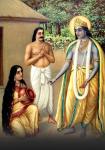 An influential Hindu organisation in the United States has slammed a group of lawmakers for introducing a resolution in the House of Representatives on record of India's religious freedom arguing that it is grossly inaccurate and aims to provoke.
An influential Hindu organisation in the United States has slammed a group of lawmakers for introducing a resolution in the House of Representatives on record of India's religious freedom arguing that it is grossly inaccurate and aims to provoke.
The resolution introduced on Monday in House of Representatives by Congressmen Keith Ellison from the Democratic Party and Joe Pitts from the Republican Party "ignores" the recent jihadi terror attacks and it fails to contextualise India's history with religious riots, alleged the Hindu American Foundation based in Washington.
"The text of the resolution was also panned for provocatively calling for the creation of an extra-judicial body of minorities empowered to hold trials," the HAF alleged.
The resolution that also called on the State Department to continue the policy of denying Gujarat Chief Minister Narendra Modi, a visa for entry into the US, has been sent to House Foreign Affairs Sub-Committee on Asia and the Pacific for necessary action.
Highly critical of Pitts, the HAF alleged that the Republican lawmaker was one of the largest recipients of financial largesse from Ghulam Nabi Fai, who is serving a two year jail sentence on charges of receiving money from Pakistan to promote its agenda on Kashmir.
"While this year's resolution condemns Hindu nationalism and recalls riots over the past decade, it noticeably fails to mention that 80 per cent of attacks that occurred in India since 2012 were carried out by the Indian Mujahideen, with the remaining 20 per cent by Maoist terrorists," HAF claimed.
"Additionally, it specifically censures Narendra Modi, India's leading prime ministerial contender for the upcoming national elections, by quoting an Indian tabloid's allegations as evidence," alleged the top advocacy Hindu body in the US.
"Terrorism and religious violence are serious issues in India today, and all Indian Americans stand united in their hope to see this scourge eradicated from the country," said Jay Kansara, HAF's associate director of Government Relations.
"But a grossly inaccurate resolution raking up decades old issues already adjudicated in India's Supreme Court, distorting history, and taking sides in an upcoming election vitiate the political process and most importantly, do no justice to the real victims of terror in India," he alleged.
While Kansara said that the tearing down of the Babari mosque by a mob in 1992 was unacceptable, he added that the resolution continues to invoke that event without noting a Indian (Allahabad) High Court's ruling that archaeological evidence confirms that a Hindu temple to Lord Rama did exist at the site before the notorious Islamic invader Babar destroyed it and built his mosque.
It fails to note that the Supreme Court's Special Investigative Team pointedly absolved Narendra Modi of any complicity in the horrific riots in Gujarat that followed the burning of Hindu pilgrims on a train by a Muslim mob, HAF said.
The resolution also ignores the serial October 2008 bombings targeting Hindu Diwali celebrations in Northeast India, that were allegedly carried out by two Christian terrorist outfits, the National Democratic Front of Bodoland and the United Liberation Front of Assam, the HAF said.
"A historical resolution such as this one, devoid of the necessary context when examining religious violence in India, only serve to provoke and inflame while serving absolutely no legislative end," said Sheetal Shah, senior director at HAF.
Image: US House of Representatives











